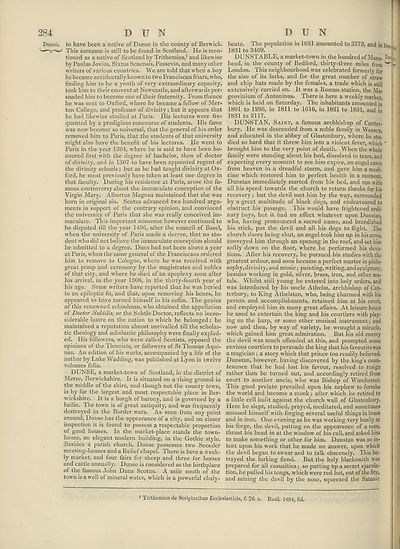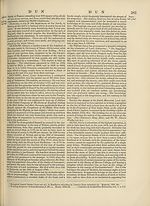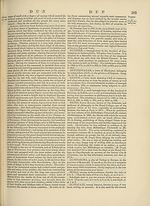Encyclopaedia Britannica > Volume 8, DIA-England
(294) Page 284
Download files
Complete book:
Individual page:
Thumbnail gallery: Grid view | List view

284 DUN
Dunse. to have been a native of Dense in the county of Berwick.
This surname is still to be found in Scotland. He is men¬
tioned as a native of Scotland by Trithemius,1 and likewise
by Paulus Jovius, Sixtus Senensis, Possevin, and many other
writers of various countries. We are told thatwdien a boy
he became accidentally known to two Franciscan friars, who,
finding him to be a youth of very extraordinary capacity,
took him to their convent at Newcastle, and afterwards per¬
suaded him to become one of their fraternity. From thence
he was sent to Oxford, where he became a fellow of Mer¬
ton College, and professor of divinity; but it appears that
he had likewise studied at Paris. His lectures were fre¬
quented by a prodigious concourse of students. His fame
was now become so universal, that the general of his order
removed him to Paris, that the students of that university
might also have the benefit of his lectures. He went to
Paris in the year 1304, where he is said to have been ho¬
noured first with the degree of bachelor, then of doctor
of divinity, and in 1307 to have been appointed regent of
the divinity schools ; but as he had taught divinity at Ox¬
ford, he must previously have taken at least one degree in
that faculty. During his residence at Paris, arose the fa¬
mous controversy about the immaculate conception of the
Virgin Mary. Albertus Magnus maintained that she was
born in original sin. Scotus advanced two hundred argu¬
ments in support of the contrary opinion, and convinced
the university of Paris that she was really conceived im¬
maculate. This important nonsense however continued to
be disputed till the year 1496, after the council of Basel,
when the university of Paris made a decree, that no stu¬
dent who did not believe the immaculate conception should
be admitted to a degree. Duns had not been above a year
at Paris, when the same general of the Franciscans ordered
him to remove to Cologne, where he was received with
great pomp and ceremony by the magistrates and nobles
of that city, and where he died of an apoplexy soon after
his arrival, in the year 1308, in the thirty-fourth year of
his age. Some writers have reported that he was buried
in an epileptic fit, and that, upon removing his bones, he
appeared to have turned himself in his coffin. The genius
of this renowned schoolman, who obtained the appellation
of Doctor Svbiilis, or the Subtle Doctor, reflects no incon¬
siderable lustre on the nation to which he belonged: he
maintained a reputation almost unrivalled till the scholas¬
tic theology and scholastic philosophy were finally explod¬
ed. His followers, who were called Scotists, opposed the
opinions of the Thomists, or followers of St Thomas Aqui¬
nas. An edition of his works, accompanied by a life of the
author by Luke Wadding, was published at Lyon in twelve
volumes folio.
DUNSE, a market-town of Scotland, in the district of
Merse, Berwickshire. It is situated on a rising ground in
the middle of the shire, and though not the county town,
is by far the largest and most respectable place in Ber¬
wickshire. It is a burgh of barony, and is governed by a
bailie. The town is of great antiquity, and was frequently
destroyed in the Border wars. As seen from any point
around, Dunse has the appearance of a city, and on closer
inspection it is found to possess a respectable proportion
of good houses. In the market-place stands the town-
house, an elegant modern building, in the Gothic style.
Besides a parish church, Dunse possesses twm Seceder
meeting-houses and a Relief chapel. There is here a week¬
ly market, and four fairs for sheep and three for horses
and cattle annually. Dunse is considered as the birthplace
of the famous John Duns Scotus. A mile south of the
town is a well of mineral water, which is a powerful chaly-
D
U N
beate. The population in 1821 amounted to 3773, and in bun
1831 to 3469.
DUNSTABLE, a market-town in the hundred of Mans- ^Ul
head, in the county of Bedford, thirty-three miles from W
London. This neighbourhood was celebrated formerly for
the size of its larks, and for the great number of straw
and chip hats made by the females, a trade which is still
extensively carried on. It was a Roman station, the Ma-
geovinium of Antoninus. There is here a weekly market,
which is held on Saturday. The inhabitants amounted in
1801 to 1296, in 1811 to 1616, in 1821 to 1831, and in
1831 to 2117.
DUNSTAN, Saint, a famous archbishop of Canter¬
bury. He was descended from a noble family in Wessex,
and educated in the abbey of Glastonbury, where he stu¬
died so hard that it threw him into a violent fever, which * j
brought him to the very point of death. When the whole
family were standing about his bed, dissolved in tears, and
expecting every moment to see him expire, an angel came
from heaven in a dreadful storm, and gave him a medi¬
cine which restored him to perfect health in a moment.
Dunstan immediately started from his bed, and ran with
all his speed towards the church to return thanks for his
recovery; but the devil met him by the way, surrounded
by a great multitude of black dogs, and endeavoured to
obstruct his passage. This would have frightened ordi¬
nary boys, but it had no effect whatever upon Dunstan,
who, having pronounced a sacred name, and brandished
his stick, put the devil and all his dogs to flight. The
church doors being shut, an angel took him up in his arms, |
conveyed him through an opening in the roof, and set him
softly down on the floor, where he performed his devo¬
tions. After his recovery, he pursued his studies with the
greatest ardour, and soon became a perfect master in philo¬
sophy, divinity, and music; painting,writing,andsculpture;
besides working in gold, silver, brass, iron, and other me¬
tals. Whilst still young he entered into holy orders, and
was introduced by his uncle Athelm, archbishop of Can¬
terbury, to King Athelstan, who, being charmed with his
person and accomplishments, retained him at his court,
and employed him in many great affairs. At leisure hours
he used to entertain the king and his courtiers with play¬
ing on the harp, or some other musical instrument; and
now and then, by way of variety, he wrought a miracle,
which gained him great admiration. But his old enemy
the devil was much offended at this, and prompted some
envious courtiers to persuade the king that his favourite was
a magician ; a story which that prince too readily believed.
Dunstan, however, having discovered by the king’s coun¬
tenance that he had lost his favour, resolved to resign
rather than be turned out, and accordingly retired from
court to another uncle, who was Bishop of Winchester.
This good prelate prevailed upon his nephew to forsake
the world and become a monk; after which he retired to
a little cell built against the church wall of Glastonbury.
Here he slept, studied, prayed, meditated, and sometimes
amused himself with forging several useful things in brass
and in iron. One evening as he was working very busily at
his forge, the devil, putting on the appearance of a man,
thrust his head in at the window of his cell, and asked him
to make something or other for him. Dunstan was so in¬
tent upon his work that he made no answer, upon which
the devil began to swear and to talk obscenely. This be¬
trayed the lurking fiend. But the holy blacksmith was
prepared for all casualties ; so putting Up a secret ejacula¬
tion, he pulled his tongs, which were red hot, out of the fire,
and seizing the devil by the nose, squeezed the Satanic
1 Trithemius de Scriptoribus Ecclesiasticis, f. 7G. a. Basil. J404, fol.
Dunse. to have been a native of Dense in the county of Berwick.
This surname is still to be found in Scotland. He is men¬
tioned as a native of Scotland by Trithemius,1 and likewise
by Paulus Jovius, Sixtus Senensis, Possevin, and many other
writers of various countries. We are told thatwdien a boy
he became accidentally known to two Franciscan friars, who,
finding him to be a youth of very extraordinary capacity,
took him to their convent at Newcastle, and afterwards per¬
suaded him to become one of their fraternity. From thence
he was sent to Oxford, where he became a fellow of Mer¬
ton College, and professor of divinity; but it appears that
he had likewise studied at Paris. His lectures were fre¬
quented by a prodigious concourse of students. His fame
was now become so universal, that the general of his order
removed him to Paris, that the students of that university
might also have the benefit of his lectures. He went to
Paris in the year 1304, where he is said to have been ho¬
noured first with the degree of bachelor, then of doctor
of divinity, and in 1307 to have been appointed regent of
the divinity schools ; but as he had taught divinity at Ox¬
ford, he must previously have taken at least one degree in
that faculty. During his residence at Paris, arose the fa¬
mous controversy about the immaculate conception of the
Virgin Mary. Albertus Magnus maintained that she was
born in original sin. Scotus advanced two hundred argu¬
ments in support of the contrary opinion, and convinced
the university of Paris that she was really conceived im¬
maculate. This important nonsense however continued to
be disputed till the year 1496, after the council of Basel,
when the university of Paris made a decree, that no stu¬
dent who did not believe the immaculate conception should
be admitted to a degree. Duns had not been above a year
at Paris, when the same general of the Franciscans ordered
him to remove to Cologne, where he was received with
great pomp and ceremony by the magistrates and nobles
of that city, and where he died of an apoplexy soon after
his arrival, in the year 1308, in the thirty-fourth year of
his age. Some writers have reported that he was buried
in an epileptic fit, and that, upon removing his bones, he
appeared to have turned himself in his coffin. The genius
of this renowned schoolman, who obtained the appellation
of Doctor Svbiilis, or the Subtle Doctor, reflects no incon¬
siderable lustre on the nation to which he belonged: he
maintained a reputation almost unrivalled till the scholas¬
tic theology and scholastic philosophy were finally explod¬
ed. His followers, who were called Scotists, opposed the
opinions of the Thomists, or followers of St Thomas Aqui¬
nas. An edition of his works, accompanied by a life of the
author by Luke Wadding, was published at Lyon in twelve
volumes folio.
DUNSE, a market-town of Scotland, in the district of
Merse, Berwickshire. It is situated on a rising ground in
the middle of the shire, and though not the county town,
is by far the largest and most respectable place in Ber¬
wickshire. It is a burgh of barony, and is governed by a
bailie. The town is of great antiquity, and was frequently
destroyed in the Border wars. As seen from any point
around, Dunse has the appearance of a city, and on closer
inspection it is found to possess a respectable proportion
of good houses. In the market-place stands the town-
house, an elegant modern building, in the Gothic style.
Besides a parish church, Dunse possesses twm Seceder
meeting-houses and a Relief chapel. There is here a week¬
ly market, and four fairs for sheep and three for horses
and cattle annually. Dunse is considered as the birthplace
of the famous John Duns Scotus. A mile south of the
town is a well of mineral water, which is a powerful chaly-
D
U N
beate. The population in 1821 amounted to 3773, and in bun
1831 to 3469.
DUNSTABLE, a market-town in the hundred of Mans- ^Ul
head, in the county of Bedford, thirty-three miles from W
London. This neighbourhood was celebrated formerly for
the size of its larks, and for the great number of straw
and chip hats made by the females, a trade which is still
extensively carried on. It was a Roman station, the Ma-
geovinium of Antoninus. There is here a weekly market,
which is held on Saturday. The inhabitants amounted in
1801 to 1296, in 1811 to 1616, in 1821 to 1831, and in
1831 to 2117.
DUNSTAN, Saint, a famous archbishop of Canter¬
bury. He was descended from a noble family in Wessex,
and educated in the abbey of Glastonbury, where he stu¬
died so hard that it threw him into a violent fever, which * j
brought him to the very point of death. When the whole
family were standing about his bed, dissolved in tears, and
expecting every moment to see him expire, an angel came
from heaven in a dreadful storm, and gave him a medi¬
cine which restored him to perfect health in a moment.
Dunstan immediately started from his bed, and ran with
all his speed towards the church to return thanks for his
recovery; but the devil met him by the way, surrounded
by a great multitude of black dogs, and endeavoured to
obstruct his passage. This would have frightened ordi¬
nary boys, but it had no effect whatever upon Dunstan,
who, having pronounced a sacred name, and brandished
his stick, put the devil and all his dogs to flight. The
church doors being shut, an angel took him up in his arms, |
conveyed him through an opening in the roof, and set him
softly down on the floor, where he performed his devo¬
tions. After his recovery, he pursued his studies with the
greatest ardour, and soon became a perfect master in philo¬
sophy, divinity, and music; painting,writing,andsculpture;
besides working in gold, silver, brass, iron, and other me¬
tals. Whilst still young he entered into holy orders, and
was introduced by his uncle Athelm, archbishop of Can¬
terbury, to King Athelstan, who, being charmed with his
person and accomplishments, retained him at his court,
and employed him in many great affairs. At leisure hours
he used to entertain the king and his courtiers with play¬
ing on the harp, or some other musical instrument; and
now and then, by way of variety, he wrought a miracle,
which gained him great admiration. But his old enemy
the devil was much offended at this, and prompted some
envious courtiers to persuade the king that his favourite was
a magician ; a story which that prince too readily believed.
Dunstan, however, having discovered by the king’s coun¬
tenance that he had lost his favour, resolved to resign
rather than be turned out, and accordingly retired from
court to another uncle, who was Bishop of Winchester.
This good prelate prevailed upon his nephew to forsake
the world and become a monk; after which he retired to
a little cell built against the church wall of Glastonbury.
Here he slept, studied, prayed, meditated, and sometimes
amused himself with forging several useful things in brass
and in iron. One evening as he was working very busily at
his forge, the devil, putting on the appearance of a man,
thrust his head in at the window of his cell, and asked him
to make something or other for him. Dunstan was so in¬
tent upon his work that he made no answer, upon which
the devil began to swear and to talk obscenely. This be¬
trayed the lurking fiend. But the holy blacksmith was
prepared for all casualties ; so putting Up a secret ejacula¬
tion, he pulled his tongs, which were red hot, out of the fire,
and seizing the devil by the nose, squeezed the Satanic
1 Trithemius de Scriptoribus Ecclesiasticis, f. 7G. a. Basil. J404, fol.
Set display mode to:
![]() Universal Viewer |
Universal Viewer | ![]() Mirador |
Large image | Transcription
Mirador |
Large image | Transcription
Images and transcriptions on this page, including medium image downloads, may be used under the Creative Commons Attribution 4.0 International Licence unless otherwise stated. ![]()
| Encyclopaedia Britannica > Encyclopaedia Britannica > Volume 8, DIA-England > (294) Page 284 |
|---|
| Permanent URL | https://digital.nls.uk/193326827 |
|---|
| Attribution and copyright: |
|
|---|
| Description | Ten editions of 'Encyclopaedia Britannica', issued from 1768-1903, in 231 volumes. Originally issued in 100 weekly parts (3 volumes) between 1768 and 1771 by publishers: Colin Macfarquhar and Andrew Bell (Edinburgh); editor: William Smellie: engraver: Andrew Bell. Expanded editions in the 19th century featured more volumes and contributions from leading experts in their fields. Managed and published in Edinburgh up to the 9th edition (25 volumes, from 1875-1889); the 10th edition (1902-1903) re-issued the 9th edition, with 11 supplementary volumes. |
|---|---|
| Additional NLS resources: |
|

